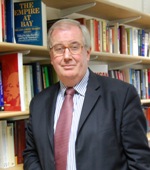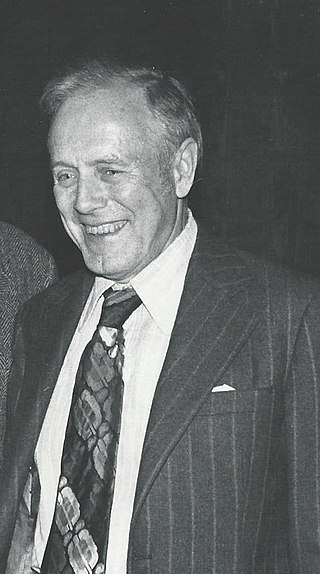Patrick James (born 1957), is Professor of International Relations at the University of Southern California in Los Angeles, CA, and Director of the USC Center for International Studies.
Patrick James (born 1957), is Professor of International Relations at the University of Southern California in Los Angeles, CA, and Director of the USC Center for International Studies.
James received his B.A. with honours in history at the University of Western Ontario in 1978, and a Ph.D in government and politics from the University of Maryland, College Park in 1984.
His first positions were as lecturer in Government and Politics at the University of Maryland, College Park, and as an Assistant Professor of Public Policy at the University of Manitoba. After receiving his Ph.D in 1984, he worked at McGill University as an Assistant and then Associate Professor of Political Science from 1984 to 1991. He then served as a Professor of Political Science at Florida State University from 1991 to 1994. From 1994 until 1998, he was chair of the Political Science Department at Iowa State University, then as Professor of Political Science there from 1999 to 2001. He then went to the University of Missouri as Professor of Political Science from 2001 until 2004, becoming the Frederick A. Middlebush Professor of Political Science from 2004 to 2005. Since 2005, he has been Professor of International Relations at the University of Southern California, as well as the Director of the Center for International Studies.
He has taught in several other fields over the course of his professional life. These fields include International Relations, Comparative Politics, Rational Choice, and Empirical Methods. He specialized in fields such as conflict, crisis and war, Canadian politics, collective action, expected utility and game theory, and research design and statistics.
James has 333 citations of his published works from 1985 to 2003, including books, symposia, articles, chapters in books, reviews, miscellaneous entries, manuscripts, and conference papers and presentations. [1]
He has published over 75 articles in peer-reviewed journals a number of book chapters, and a great many book reviews, conference presentations, lectures, and other items.

Bassam Tibi, is a Syrian-born German political scientist and professor of international relations specializing in Islamic studies and Middle Eastern studies. He was born in 1944 in Damascus, Syria to an aristocratic family, and moved to West Germany in 1962, where he later became a naturalized citizen in 1976.

Janice Gross Stein is a Canadian political scientist and international relations expert. Stein is a specialist in Middle East area studies, negotiation theory, foreign policy decision-making, and international conflict management.

Thomas Homer-Dixon is a Canadian political scientist and author who researches threats to global security. He is the founder and Executive Director of the Cascade Institute at Royal Roads University in Victoria, British Columbia. He is the author of seven books, the most recent being Commanding Hope: The Power We Have to Renew a World in Peril.

Peace and conflict studies or conflict analysis and resolution is a social science field that identifies and analyzes violent and nonviolent behaviors as well as the structural mechanisms attending conflicts, to understand those processes which lead to a more desirable human condition. A variation on this, peace studies, is an interdisciplinary effort aiming at the prevention, de-escalation, and solution of conflicts by peaceful means, based on achieving conflict resolution and dispute resolution at the international and domestic levels based on positive sum, rather than negative sum, solutions.
Sergei M. Plekhanov is a Canadian political scientist who is Associate Professor of Politics at York University in Toronto, Ontario, Canada.
Jennifer Mary Welsh is a Canadian professor of international relations, currently working as the Canada 150 Research Chair in Global Governance and Security at McGill University. Welsh is the Director of the Centre for International Peace and Security Studies at McGill's Max Bell School of Public Policy, and a co-director of the Canadian Research Network on Women, Peace and Security. Welsh is a frequent commentator in Canadian media on foreign affairs.

Thazha Varkey Paul is an Indo-Canadian political scientist. He is a James McGill professor of International Relations in the department of Political Science at McGill University. Paul specializes in International Relations, especially international security, regional security and South Asia. He served as the president of the International Studies Association (ISA) during 2016–2017, and served as the founding director of the McGill University – Université de Montreal Centre for International Peace and Security Studies (CIPSS).

Michael E. Cox is a British academic and international relations scholar. He is currently Emeritus Professor of International Relations at the London School of Economics (LSE) and Director of LSE IDEAS. He also teaches for the TRIUM Global Executive MBA Program, an alliance of NYU Stern and the London School of Economics and HEC School of Management.

William Thornton Rickert Fox, generally known as William T. R. Fox, was an American foreign policy professor and international relations theoretician at the Columbia University. He is perhaps mostly known as the coiner of the term "superpower" in 1944. He wrote several books about the foreign policy of the United States of America and the United Kingdom. He was a pioneer in establishing international relations, and the systematic study of statecraft and war, as a major academic discipline. National security policy and an examination of civil-military relations were also focuses of his interests and career. He was the founding director of Columbia's Institute of War and Peace Studies and held the position from 1951–1976.
Barnett Richard Rubin is an American political scientist and a leading expert on Afghanistan and South Asia. He is the author of eight books and is currently senior fellow and director at the Center on International Cooperation at New York University, a leading foreign policy center. He was previously senior advisor to the US special representative for Afghanistan and Pakistan. He has advised the United Nations, NATO, the United States, and the Afghan government on numerous policy matters, including aid policy, security policy, and diplomatic strategy.

Canada and Germany have positive relations, as they are close allies and fellow NATO and G7 members.

Stephen M. Saideman is a political scientist who holds the Paterson Chair in International Affairs at Norman Paterson School of International Affairs at Carleton University in Ottawa, Canada. He has been the Canada Research Chair in International Security and Ethnic Conflict at McGill University, in Montreal. He has written four books as well as articles and book chapters. His work has focused on the international relations of ethnic conflict, and comparative civil-military relations.

Howard Adelman was a Canadian philosopher and university professor. He retired as Professor Emeritus of Philosophy at York University in 2003. Adelman was one of the founders of Rochdale College, as well as the founder and director of York's Centre for Refugee Studies. He was editor of Refuge for ten years, and since his retirement he has received several honorary university and governmental appointments in Canada and abroad. Adelman was the recipient of numerous awards and grants, and presented the inaugural lecture in a series named in his honor at York University in 2008.
James D. Morrow is the A.F.K. Organski Collegiate Professor of World Politics at the University of Michigan and a member of the American Academy of Arts and Sciences, best known for his pioneering work in noncooperative game theory and selectorate theory.
Fen Osler Hampson is Chancellor's Professor and Professor of International Affairs at Carleton University and President of the World Refugee & Migration Council. He was a Visiting Fellow at The New Institute and a Distinguished Fellow and Director of Global Security Research at The Centre for International Governance Innovation. He was Co-Director of the Global Commission on Internet Governance. He was elected a Fellow of the Royal Society of Canada.
Michael Brecher was a Canadian political scientist and teacher in Quebec.

Lars-Erik Cederman is a Swiss-Swedish political scientist and professor of International Conflict Research at ETH Zurich. His main fields of research are ethnic inequality and conflict, power-sharing, state formation and nationalism.
Salvador Santino Regilme is a Dutch International Relations scholar and political scientist focusing on international human rights norms, global governance, democratization, United States foreign policy, and foreign aid. He is a tenured Associate Professor of International Relations based at the Institute of History within the Faculty of Humanities of Leiden University, the Netherlands.
The foreign policies of Canada and its predecessor colonies were under British control until the 20th century. This included wars with the United States in 1775-1783 and 1812–1815. Economic ties with the U.S. were always close. Political tensions arose in the 19th century from anti-British sentiment in the U.S. in the 1860s. Boundary issues caused diplomatic disputes resolved in the 1840s over the Maine boundary. and early 1900s, in the early 20th century over the Alaska boundary. There is ongoing discussion regarding the Arctic. Canada-US relations have been friendly in the 20th and 21st centuries.
Norrin M. Ripsman is a Canadian political scientist whose research mainly examines security, regional peacemaking, and neoclassical realism. Before 2016, he taught at Concordia University, Quebec, Canada. Since 2016, he has been Monroe J. Rathbone Professor in the International Relations Department at Lehigh University, Pennsylvania, US.